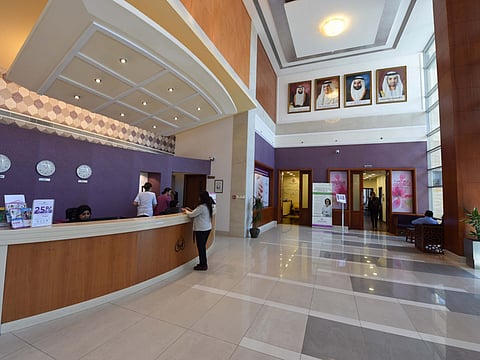Can’t avoid visiting a hospital in COVID-19 times? Here’s what you should know in UAE
Emergency doctors outline patient safety protocols that are in place

Dubai: Telemedicine and video consultation services have picked up big time in COVID-19 times, but there are situations where residents still have to see the doctor personally. Such cases include women in labour, road trauma patients, children involved in choking incidents and even patients suffering from heart attacks and strokes. All these scenarios require that the patient immediately reports to an emergency at a hospital.
All hospitals in the UAE have made safe arrangements for patients requiring physical consultations, following COVID- 19 protocols laid out by the Ministry of Health and Prevention. But there are some things patients must keep in mind too before they make a visit.
As Dr Ravi Arora, consultant endocrinologist and internal medicine specialist at NMC Speciality Hospital, Abu Dhabi, explained: ”Patients are strongly advised to stay at home and manage their conditions through tele or video consultations. A majority of patients who are diabetics or suffer from thyroid or other endocrine disorders have shifted to distance consultations. However, if there is a situation where distance consulting won’t work and you have to see a doctor, patients must follow a few precautionary steps.”
He said, “Wherever possible, they must make prior appointment by phone with the emergency of the nearest hospital and provide their Emirates ID details for registration so that when they come to the hospital, they can be attended to right away.”
He said patients are advised to wear Personal Protective Equipment (PPE) such as masks and gloves and carry hand sanitiser with them.
Dr Arora said most hospitals have segregated areas of treatment for non-COVID-19 patients.
“First patients are screened at the gate, their temperatures recorded, a quick 10-second history taken even before they enter the ER. If they do not have PPE, it is provided to them. If there is a slight suspicion regarding COVID-19, the patient is sent to a separate area. All those getting admitted to the hospital have to undergo a mandatory COVID-19 swab test,” he said.
Giving an example, he said, “We have had cases of those requiring cardiac surgery turning out COVID-19 positive. In such cases, the patient is wheeled into isolated Operation Theatres designated for them and later admitted into negative pressure rooms where they recover from surgery as well as COIVD-19.”
Dr Sara Ahmedi, General Physician from the Emergency Department of Saudi German Hospital, reassured patients that they need not fear a visit to the ER if it is unavoidable. “We have taken all precautions in four major areas of the hospital. COVID-19 positive patients have a completely different entry place and are whisked off to the ICU or negative pressure rooms. They do not even come to the main entrance of the hospital.”
She said, “At the main entrance, we only take Category 4 and 5 patients (who have no life-threatening condition but require urgent care). Next, we have a quick triage facility before the patient enters the emergency. Temperatures and history are taken and at the slightest suspicion, doctors transfer the patient to the respiratory clinic where he or she undergoes the swab test. All doctors and nurses and paramedics are attired in full PPE and we provide masks and gloves to patients and maintain proper social distancing. Even beds are placed at two metre distances.”
Dr Ahmedi said patients who feel the slightest discomfort must report to the ER. “We have had patients come in with anxiety for COVID-19, however upon conducting proper tests such as ECG and other examinations, we have been able to catch heart attacks, strokes and seizures in time. I had a patient come in with abdominal pain and upon examination, we found he needed emergency appendectomy. Therefore, patients who feel something is wrong must report to the hospital. Once a patient is admitted, he or she has to mandatorily undergo a COVID-19 swab test so that adequate precautions can be taken for treatment.”
Dr Tope Odafa, director of Emergency Medicine at RAK Hospital, specified that doctors and nurses who wear disposable gowns discard them after attending to each patient.
“We advise patients to come in only under unavoidable circumstances. We cater to them with utmost precautions to stem any potential for contamination. We use one disposable gown over PPE per patient and use segregated entrances for patients. Each and every patient is provided face masks, gloves and sanitiser, asked to maintain a distance of 1 metre apart and not touch any surfaces unnecessarily,” added Dr Odafa.
Check-list before you visit a hospital
Assess your situation and try telemedicine consult, if that does not work and you need a physical consult, only then go to the hospital
If possible, call the emergency in advance, furnish your details and register by phone to avoid unnecessary exposure.
Avoid taking other family members to the hospital wherever possible to minimise exposure
Wear your mask, gloves and carry hand sanitser
Maintain proper social distance at the hospital and avoid touching unnecessary surfaces
At the Triage, answer all questions related to your health and personal history honestly
Follow hospital instructions and use segregated entrances earmarked for non-COVID-19 patients
Sign up for the Daily Briefing
Get the latest news and updates straight to your inbox





